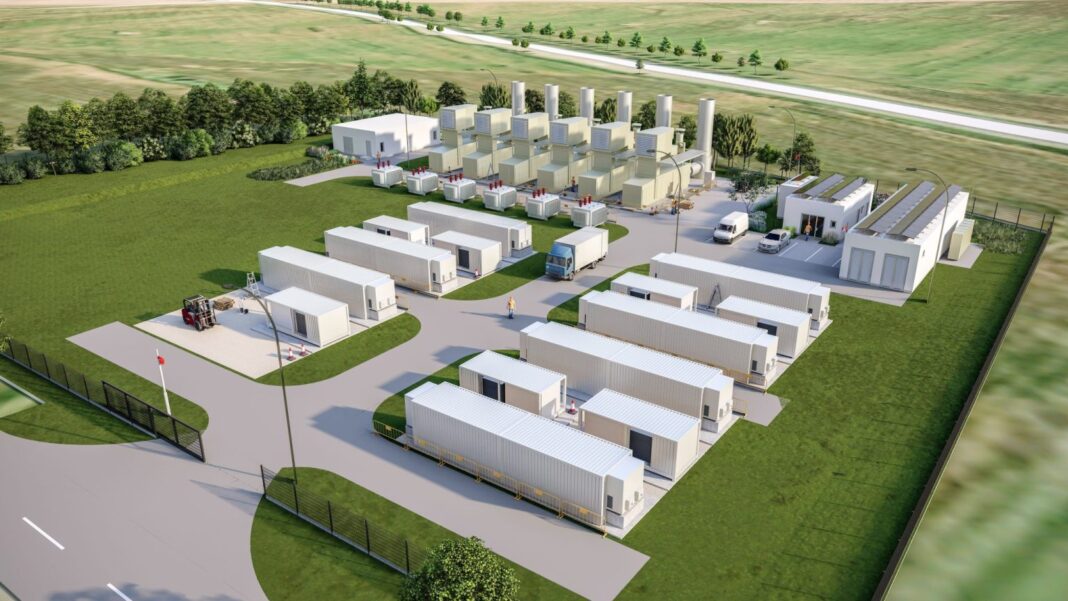The Czech group DECCI has started the construction of a modern source of support services of power balance (SVR) with a total capacity of 30 megawatts called Energy nest. Construction began on March 30, 2023, with the goal of this hybrid source being put into operation in May 2024. At the moment of commissioning, it will become a flexible energy source with the largest battery storage in the Czech Republic. The Energy nest hybrid resource is implemented in the cadastre of the village of Vraňany, district of Mělník.
The company Siemens, s.r.o. is participating in the project as the contractor of the hybrid source, the main technology suppliers are the company Centrax Ltd, UK and SMA Altenso, GmbH. However, space is also given to Czech experts, namely the Czech Institute of Informatics, Robotics and Cybernetics, CTU, which develops control algorithms based on machine learning for the project.
„Thanks to the battery energy storage system (BSAE), the Energy nest hybrid source enables the regulation power required by the transmission system operator to be released immediately. The limited endurance of the BSAE is compensated by the inclusion of combustion turbines with a quick start, high power dynamics and low emissions. The technical solution represents a combination of resources that synergistically complement each other. The concept of a hybrid source was developed with the aim of strengthening the energy security of the Czech Republic and supporting the decarbonization of Czech Energy,“ Darina Merdassi, a member of the board of directors of E.nest Energy a.s., presents the project. „ČEPS analyzes show that the current development of the energy industry can lead to a dramatic decrease in regulatory performance for the provision of SVR. The hybrid power source we are building is a pioneering solution for ensuring a sufficient volume of SVR and thus maintaining the ability to ensure a performance balance between the consumption and production of electrical energy. Our solution is modular, scalable and easily replicable,“ adds Darina Merdassi.
Energy nest – a hybrid source
The hybrid power source will include battery storage with a capacity of 20 megawatts and a capacity of 22 megawatt hours, and combustion turbines with a total capacity of 30 megawatts technically derived from aircraft engines, which will ensure a high level of flexibility with minimal operating costs. The hybrid source will be capable of providing any combination of SVRs, namely automatic frequency regulation (FCR) backup, automatic activation power balance regulation backup (aFRR+) or manual activation power balance regulation backup (mFRR+) up to a total power of 30 MW.
Energy nest – an innovative technological solution helps meet climate goals
The Energy nest hybrid source was designed in accordance with the concept of modern energy and promotes the idea of separating the production of electricity from the provision of SVR. A conventional SVR source (e.g. a coal-fired power plant) must be in continuous operation when providing SVR, in contrast, Energy nest can be kept in standby mode outside of service activation with a minimal emission footprint and without inefficient fuel use.
The Energy nest technological solution is designed in such a way that in the future it will be possible to use green hydrogen as a fuel. The hybrid resource concept will thus support the achievement of national climate goals.
Partners of the Energy nest project
The investor of the project and the future operator of the hybrid resource is the company E.nest Energy a.s. The main partners of the Energy nest project are the following companies:
- Siemens, s.r.o. as a general contractor, supplier of construction, technological parts and control system,
- Centrax Ltd, UK, supplier of aeroderivative turbines with the option of burning green hydrogen. The contract for their supply was ceremoniously signed on March 30, 2023 at the British Embassy under the patronage of British Ambassador Matthew Robert Field,
- SMA Altenso GmbH, supplier of batteries and power electronics / inverters,
- The Czech Institute of Informatics, Robotics and Cybernetics, CTU, which, as part of the TAČR program TK04020051 and in cooperation with project partners, develops advanced control algorithms based on machine learning, enabling the quality of the services provided to exceed the criteria defined by the ČEPS Code while minimizing operating costs and CO2 and NOx emissions ,
- Euroenergy, spol. s r.o., consulting and advisory activities in the field of technical-economic models and analyses.
About the DECCI group
The DECCI Group is an energy group that belongs to the pioneers of the renewable resources industry in the Czech Republic. He perceives the importance of innovative energy solutions and their integration into everyday life. It focuses on projects in the field of modern energy in terms of production, accumulation and distribution.
About the AKU-BAT
The DECCI Group is a founding member of the Association for Energy Storage AKU-BAT, which brings together the most important entities active in the field of energy storage and is a founding member of the Union of Modern Energy. AKU-BAT supports the cooperation of its members in the entire spectrum of services, from the use of storage in industry, energy or as an element of flexibility, through e-mobility to the development of hydrogen technologies.
Source: Press Release DECCI from 4/4/2023 (in Czech only)



